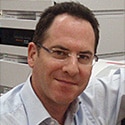Access Agilent eNewsletter June 2016

Agilent collaborates with Academia—from investigating arsenic mysteries to understanding the complexity of biology
Andrea Zenker
Agilent Academia Market Manager
Emma Liu
Agilent Academia Market Program Manager
Agilent helps scientists around the world to be successful in their research. The application range is broad—from the exploration and development of new ingredients and food components to the understanding of life’s complexities. Agilent supports researchers with cutting-edge and innovative technologies that result in trusted and reliable products and workflows. To this end, partnerships and collaborations are very important to Agilent in the development of world-leading platforms and solutions. This article highlights recent collaborations in Academia.

Figure 1. “People want to know the level of arsenic in their food and is it harmful to their health,”
—Dr. Brian Jackson

Figure 2. “The question is one of efficiency. How do we make plants more efficient?”
—Dr. Harvey Millar

Figure 3. "Microalgae are providing some bio-specific pathways for synthesizing their sugars, also called glycans, that are a mix of what happens in higher plants and what happens in humans."
—Dr. Muriel Bardor

Figure 4. "Understanding natural variations among healthy individuals will provide a foundation for understanding the onset of cancer, diabetes, and neurodegenerative diseases."
—Dr. Markus Wenk

Figure 5. “We’re now able to go into a biological question with or without having a target in mind. We can let the analysis tell us what we should be paying attention to.”
—Dr. John McLean
Accurately measuring arsenic levels in food helps protect the public
In food science, qualitative and quantitative investigations and analysis are applied. Dr. Brian Jackson, Director of Trace Metal Analysis, Dartmouth College Hanover, has investigated the mysteries surrounding arsenic being found in rice, juice and wine (Figure 1). Highly sensitive instruments, such as the Agilent 8800 ICP-QQQ, are used to measure lower and lower concentrations of this and other elements.
Using metabolic pathways to increase crop yields
Dr. Harvey Millar, Winthrop Professor at the University of Western Australia, is a plant biologist investigating ways to grow enough crops to feed the population of 9.5 billion people expected by 2050 (Figure 2). The team’s primary goal is to find metabolic pathways that can be modified to make plants stronger and increase yields.
Agilent optimizes glycan analysis workflows
Another strategic collaboration area for Agilent is —omics, which includes proteomics, genomics and the diverse segments of metabolomics. Input and feedback from our collaborators help in improving operating and data analysis software and establishing innovative workflows. Dr. Muriel Bardor, Professor at University of Rouen (Figure 3), performs in-depth characterization of glycans. Glycosylation is an important field in biopharmaceuticals, as the glycosylation pattern of the protein influences the half-life, activity, and biosafety of drugs. Working together, Agilent has helped in optimizing glycan analysis workflows.
Agilent LC and MS solutions help advance understanding of lipids
Next to glycans, lipids are another important group of biological molecules in the overall theme of metabolomics. Many research groups have been working on lipids for years, but there are still gaps in understanding the metabolism of certain molecules, such as cholesterol and its impact on human health. Dr. Markus Wenk, Professor at National University of Singapore (Figure 4), is an expert in this field. He and his team are part of an international research consortium using Agilent solutions—primarily liquid chromatography and high-resolution mass spectrometry—to advance the world’s understanding of lipids. Agilent helped the team set up sensitive and reproducible methods for these challenging analytics. A training course, hosted at National University of Singapore, shares the group’s finding and insights with scientists around the world.
Agilent provides research solutions across the "omics" areas
Integrated biology tries to understand the complexity of biology by using multiple omics approaches. Whether studying the causes and treatments of disease, or the underlying mechanisms of compound toxicity, integrated multi-omics research can lead to unique groundbreaking insights. Agilent provides research products and tools across the “omics” areas.
Dr. John A. McLean, Vanderbilt University Nashville, is gleaning insights from big data (Figure 5). He said, “We’re breaking the old paradigm of individual omics studies—genomics, proteomics, and so on—and taking a truly untargeted, unbiased survey of the molecular inventory, using ion mobility coupled with mass spectrometry."
Untargeted experiments mean the analysis of thousands of components in a single run. The goal is not the understanding of a single molecule and its impact, but looking for a hidden pattern or meaningful correlation in the experiment. One project which helps in understanding the complexity is called Bacteria Fight Club. This project involves collecting bacteria in caves that have never seen humans before and then performing genetic analysis. Ultimately, the results can aid in isolating many new drug molecules.
Agilent—a trusted scientific partner to academic researchers the world over
Mutual understanding and defined scope of work are the backbone of these productive collaborations. From instrument vendor… to grant sponsor and supporter… to research partner, Agilent contributes diverse resources—each customized to the nature of the collaboration.
This close interaction with scientific experts is an important part of Agilent`s strategy to be a trusted scientific partner, while publicly recognizing the meaningful contributors in these application fields. To read more about these collaborations, visit our academia page.
Agilent provides a wide range of products and solutions that support research
From gas chromatography to liquid chromatography and mass spectrometry, and from ICP-MS, to ICP-OES and MP-AES to Genomics, Agilent has the integrated solutions, tools, software, supplies, and services to improve efficiencies in your busy laboratory. Contact your Agilent representative today and start optimizing your research.
Stay informed about the applications that are important to you
Subscribe to Access Agilent
Our free customized
monthly eNewsletter
All articles in this issue
 New Agilent 8900 ICP-QQQ delivers increased sensitivity, improved accuracy, and higher productivity
New Agilent 8900 ICP-QQQ delivers increased sensitivity, improved accuracy, and higher productivity New Agilent 1260 Infinity II LC system delivers higher level of operational efficiency
New Agilent 1260 Infinity II LC system delivers higher level of operational efficiency Robust Agilent 6470 Triple Quadrupole LC/MS delivers confident quantification and streamlined workflows
Robust Agilent 6470 Triple Quadrupole LC/MS delivers confident quantification and streamlined workflows Achieve accurate analysis of sulfur and nitrogen with the new and simplified Agilent 8355 SCD
Achieve accurate analysis of sulfur and nitrogen with the new and simplified Agilent 8355 SCD Agilent 1290 LC and 6550 iFunnel Q-TOF combine to provide fast, high-resolution peptide mapping of innovator and biosimilar mAbs
Agilent 1290 LC and 6550 iFunnel Q-TOF combine to provide fast, high-resolution peptide mapping of innovator and biosimilar mAbs Agilent collaborates with Academia—from investigating arsenic mysteries to understanding the complexity of biology
Agilent collaborates with Academia—from investigating arsenic mysteries to understanding the complexity of biology Excellent inertness for analysis of challenging polar compounds
Excellent inertness for analysis of challenging polar compounds Detection of semivolatile extractables and leachables (E&Ls) found in pharmaceutical products
Detection of semivolatile extractables and leachables (E&Ls) found in pharmaceutical products Agilent multi-omics solutions unravel the effects of low-level gamma radiation on rice seeds
Agilent multi-omics solutions unravel the effects of low-level gamma radiation on rice seeds Agilent comprehensive water screening solution reliably identifies wastewater contaminants of emerging concern:
Agilent comprehensive water screening solution reliably identifies wastewater contaminants of emerging concern:
A real-life application